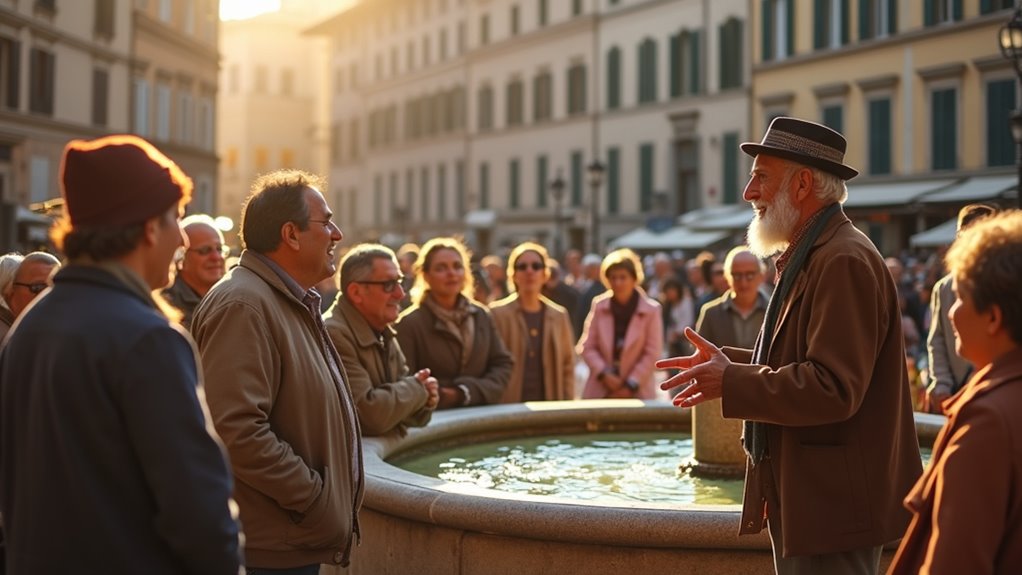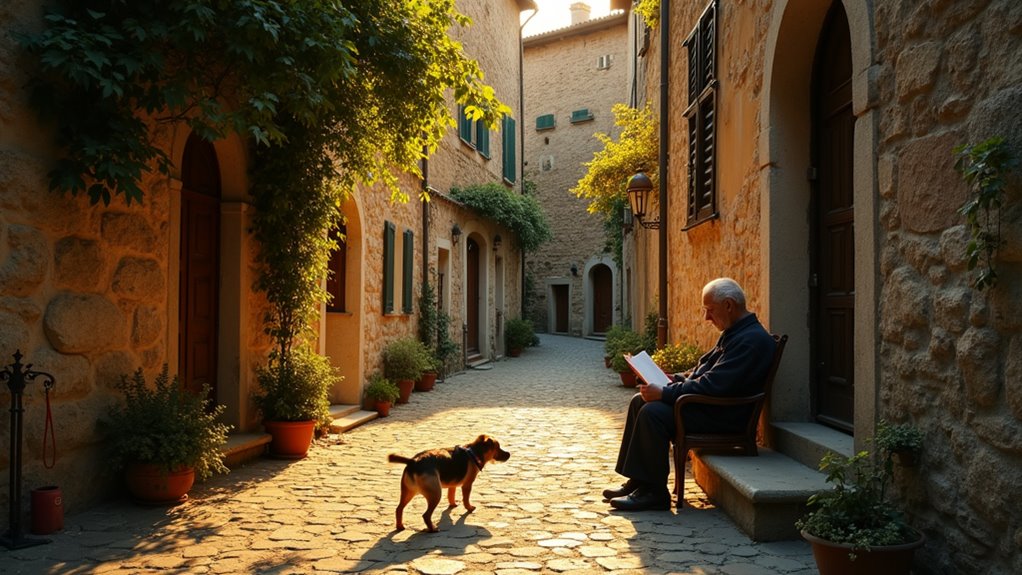Physical Address
304 North Cardinal St.
Dorchester Center, MA 02124
Physical Address
304 North Cardinal St.
Dorchester Center, MA 02124

A treasure trove of Italian wisdom awaits in these 20 quotes that reveal profound cultural insights about love, life, and success.
Italian proverbs offer timeless wisdom in concise, culturally affluent expressions. You’ll discover profound insights like “Chi la dura, la vince” (persistence leads to success) and “L’abito non fa il monaco” (don’t judge by appearances). These sayings reflect Italy’s values on relationships, success, and life philosophy. From “Il Dolce Far Niente” celebrating peaceful relaxation to “Pane al pane, vino al vino” advocating direct communication, these quotes capture centuries of Italian cultural understanding. Explore these phrases to access the Italian perspective on life’s greatest truths.

Why are Italian quotes so universally cherished? They capture life’s wisdom in beautifully concise expressions, reflecting Italy’s profound cultural history and philosophical depth.
Italian wisdom distills life’s complexities into eloquent, timeless expressions born from centuries of rich cultural heritage.
Italians have given us gems about life choices like “Tra il dire e il fare c’è di mezzo il mare” (between saying and doing lies the sea) and “Meglio un uovo oggi che una gallina domani” (better an egg today than a chicken tomorrow). These timeless sayings capture the practical wisdom that has guided generations through difficult decisions.
When considering appearance and perception, remember “L’abito non fa il monaco” (the habit doesn’t make the monk) reminds you not to judge by appearances, while “Rosso di sera bel tempo si spera” offers weather wisdom.
For strength and persistence, “Chi va piano, va sano e lontano” encourages taking life slowly for lasting success, and “La calma è la virtù dei forti” celebrates calmness as strength’s companion.
Some proverbs like “Ride bene chi ride ultimo” teach us that celebrating too early can lead to disappointment, as true victory belongs to who laughs last.
Among Italy’s most enduring philosophical gems, “Chi la dura, la vince” captures a universal truth about human achievement. Literally translated as “he who lasts it wins it,” this proverb emphasizes that persistence ultimately leads to success.
Unlike sayings that celebrate luck, this Italian expression links triumph directly to endurance. The proverb reflects deep cultural beliefs in the transformative power of resilience when facing adversity. You’ll find it’s not about passive waiting but active perseverance through challenges.
This philosophy resonates across cultures, similar to the Japanese “fall seven times, stand up eight.”
Today, you’ll hear it encouraging language learners tackling Italian grammar, motivating athletes in cycling competitions, or inspiring entrepreneurs in Italy’s business landscape. When visiting Rome, this saying can remind travelers to maintain patience when encountering common hassles that might otherwise diminish their experience. Remember, when you’re facing difficulties, this centuries-old wisdom reminds you that your willingness to persist may be your greatest advantage.

While persistence may move mountains, it’s love that moves the heavens in Dante Alighieri’s universe. The famous line “L’amor che move il sole e l’altre stelle” concludes his masterpiece “Divina Commedia,” encapsulating the poet’s belief that love is the fundamental cosmic force.
You’ll find this phrase reflects medieval Christian philosophy where divine love governs all creation. It’s not merely about romantic feelings but encompasses familial, platonic, and spiritual connections. The universal concept connects human affection to poetic infinity, linking together our love for others, literature, and the cosmos itself.
This powerful closing line has transcended literature to become a cultural touchstone in Italy and beyond. When Italians reference this quote, they’re invoking centuries of philosophical tradition that sees love as transformative—not just in personal relationships but as the very energy that maintains cosmic harmony and order. While this quote resonates throughout Italy, visitors to Florence’s landmarks can experience Dante’s influence most directly in the city where he was born and where his literary genius first took shape.
Few Italian sayings capture the essence of friendship quite like “Chi trova un amico, trova un tesoro” (Who finds a friend, finds a treasure). This beloved proverb uses parallel structure with the repeated “trova” to emphasize how friendship equals wealth in Italian culture.
You’ll hear this expression across generations and regions in Italy, from schoolyards to family gatherings. Italians use it to celebrate new friendships, mark reunions, or teach children about trust. This sentiment aligns with the Italian value that patience and perseverance are key qualities in building lasting relationships. Just like Italians seek the warmest destinations for comfort and connection, they also treasure friendships that provide emotional warmth.
The saying cleverly positions emotional bonds above material possessions through its economic metaphor.
Unlike many quotes, it lacks a single author, emerging instead from folk wisdom. It’s similar to the English “A friend in need is a friend indeed” but with the distinctly Italian emphasis on treasuring social connections.

The Italian proverb “Il mondo è bello perché è vario” (The world is beautiful because it’s varied) captures a profound appreciation for diversity that resonates throughout Italian culture.
Similar to the English saying “it takes all kinds to make a world,” this expression celebrates differences as essential to life’s beauty.
When you embrace this philosophy, you’ll find that variety enhances your experiences and fosters creativity.
This sentiment is perfectly exemplified in Bologna’s cultural richness, where diverse architectural styles and culinary traditions create one of Italy’s most vibrant cities.
Italians use this phrase to promote acceptance of different lifestyles, perspectives, and cultural traditions. Often spoken in response to unusual behaviors, this saying serves as a gentle reminder that eccentricity has its rightful place in society.
It’s not just about tolerating differences but actively appreciating them.
The proverb’s universal message crosses cultural boundaries, appearing in similar forms worldwide.
One of Italy’s most profound expressions about personal strength comes through the timeless saying “La calma è la virtù dei forti” – meaning “Calm is the virtue of the strong.”
Just as Italians celebrate diversity in their world, they equally value emotional composure as a marker of true inner power.
This cultural cornerstone teaches you to approach life’s challenges with serenity rather than impulsiveness.
In daily applications, you’ll find this wisdom particularly valuable when:
This philosophy becomes especially important when traveling through unexpectedly dangerous locations in Italy where maintaining composure can help you navigate unfamiliar situations safely.
Similar to “Keep Calm and Carry On,” this proverb reminds you that genuine strength manifests through tranquility, not agitation. This philosophy is particularly evident during academic pressure, where maintaining mental clarity helps students perform better on exams than those who succumb to panic.

Among Italy’s most treasured proverbs about family bonds, “Una buona mamma vale cento maestre” captures the profound reverence Italians hold for maternal wisdom. This saying—translating to “a good mother is worth a hundred teachers”—reflects the cultural emphasis on motherhood as foundational to a child’s development.
You’ll notice the metaphorical weight of “vale” (is worth), contrasting one mother against numerous educators. The proverb recognizes that mothers serve as primary educators in life, imparting wisdom that extends far beyond classroom knowledge. The proverb’s rhythmic alliteration enhances its memorability in oral tradition. Often cited during Festa della Mamma, it celebrates the irreplaceable role mothers play in moral and intellectual guidance. In Trieste, locals often discuss this cherished saying while enjoying morning pastries at the city’s celebrated breakfast cafés.
Though sometimes attributed to Victor Hugo, this detto popolare remains deeply embedded in Italian cultural identity, where maternal influence traditionally supersedes formal education in shaping lifelong values and character.
Perhaps nowhere is Italian wisdom more evident than in the concept of “Il Dolce Far Niente”—the sweetness of doing nothing. Unlike cultures that glorify constant productivity, this philosophy celebrates the art of relaxation and finding joy in life’s simple moments.
To embrace this timeless Italian concept:
You’ll find that practicing “Il Dolce Far Niente” isn’t about laziness but rather about enhancing your well-being.
This cultural approach to life reminds us that sometimes the most fulfilling moments come when we’re simply being, not doing. The idyllic island of Capri, Italy perfectly embodies this philosophy with its relaxed atmosphere and stunning natural beauty. Incorporating this philosophy involves developing inner peace through mindful connection with present experiences rather than constantly thinking about the future.

While Italians celebrate the art of doing nothing, they’re equally adept at recognizing when nothing is disguised as something—a wisdom captured perfectly in “Can che abbaia non morde.”
This centuries-old proverb, literally meaning “a dog that barks doesn’t bite,” serves as both social commentary and practical advice in Italian culture.
You’ll find this saying across many languages, from French to Japanese, all conveying the same psychological insight: those who threaten loudly rarely follow through.
When you encounter someone making aggressive noise, this proverb suggests they’re likely compensating for lack of actual power. Similar to the expression “Non svegliare il cane che dorme,” Italians understand the wisdom of not disturbing peace.
The saying’s structure—contrasting vocal warnings with physical harm—makes it memorable and applicable in modern contexts.
Whether in business negotiations or personal conflicts, Italians use this wisdom to distinguish genuine threats from empty posturing. Tourists visiting Italy should remember this wisdom when faced with common cultural misunderstandings that might otherwise escalate unnecessarily.
“A tavola non si invecchia” – at the table, one never grows old – captures the essence of Italian dining culture in five simple words. This timeless proverb reflects how Italians view mealtime as more than just eating; it’s about preserving connections across generations.
When you understand this philosophy, you’ll appreciate why Italian dining remains central to their cultural identity:
This saying remains relevant today as Italians continue celebrating life’s simple pleasures through communal dining. Visitors to Milan can experience this authentic cultural tradition in a city known for its safe dining environments, even while exploring as travelers. The tradition dates back to Roman times, when elaborate feasts and parties brought together people to share in culinary delights that incorporated diverse cultural influences.

When Mina’s sultry voice delivered the phrase “L’importante è finire” in 1975, she couldn’t have known this seemingly simple expression would transcend its controversial origins to become a cultural touchstone of Italian resilience.
Initially banned for its perceived sexual content, this bossa nova-funk track ironically peaked at #2 for seven weeks.
The quote—literally meaning “the important thing is to finish”—offers a philosophical counterpoint to “ends justify means” by emphasizing perseverance rather than shortcuts. This perspective contrasts with the more Machiavellian philosophy of “Il fine giustifica i mezzi” that prioritizes results over methods.
You’ll find this expression now celebrated across generations, from Pinterest motivational boards to language learning platforms.
Its genre-blending arrangement by Pino Presti, featuring early drum machines and Moog synths, continues influencing modern artists.
Despite censorship, or perhaps because of it, this anthem of completion remains relevant nearly five decades later.
Many Italians visiting the Amalfi Coast debate whether to stay in Naples or the resort town of Sorrento when seeking to experience authentic Italian culture.
“Tutto il mondo è paese,” with its deceptively simple assertion that “all the world is a village,” captures Italy’s profound understanding of our shared humanity across borders. This proverb gained prominence during Italy’s mass emigration period (1870-1914) but remains remarkably relevant today.
The saying offers several timeless insights:
Often this expression carries a negative connotation, implying that undesirable human traits and problematic situations are unfortunately universal.
You’ll find regional variations like the Sicilian “Tuttu lu munnu è paisi” and Venetian “Tuto ‘l mond xe paese,” each preserving the core philosophy that despite our differences, humanity shares fundamental experiences worldwide.
For those embarking on solo travel adventures in Italy, understanding this cultural perspective can enrich your experience by fostering meaningful connections with locals.

While Italy’s understanding of global community reveals our shared humanity, another timeless sentiment illuminates the most fundamental human bond. “Amor di madre, amore senza limiti” (a mother’s love, love without limits) captures the essence of maternal devotion in Italian culture.
This phrase resonates deeply in Italian society, where maternal love forms the cornerstone of family life. You’ll hear it echoed during Festa della Mamma celebrations and in complementary sayings like “La mamma è sempre la mamma” and “Una buona mamma vale cento maestre” (a good mother is worth a hundred teachers). This celebration began in May 1957 when a parish priest in Assisi introduced the holiday that would quickly spread throughout Italy’s regions. Many Italians also visit popular destinations in June to celebrate family bonds after Mother’s Day festivities.
These expressions reflect the ancient reverence for motherhood that has evolved from festivals honoring goddesses like Rhea to modern celebrations. A mother’s unconditional love is seen as both nurturing and educational—a force that shapes values and builds resilient family structures.
Have you ever noticed how fulfillment often follows bold action? The Italian proverb “Chi non risica non rosica” captures this universal truth. With Tuscan roots combining “risicare” (risk) and “rosicare” (to gnaw/eat), it literally means “who doesn’t risk doesn’t gnaw”—suggesting rewards come only to those who dare.
This timeless wisdom applies across contexts:
When traveling with family to Italy, embracing this philosophy might lead you to choose family-friendly hotels in Naples that offer unique cultural experiences rather than playing it safe.
The proper pronunciation of this proverb, with phonetic emphasis on the first syllables of the key words, helps speakers convey its motivational impact authentically.
Similar to the English “nothing ventured, nothing gained,” this proverb carries the visceral imagery that makes Italian wisdom so compelling.

When life presents its darkest challenges, Italians often turn to the timeless wisdom of “Finché c’è vita, c’è speranza” (While there’s life, there’s hope).
This proverb, deeply rooted in Latin tradition, reflects Italy’s historical resilience through countless upheavals.
You’ll find this saying paired with its sibling proverb “la speranza è l’ultima a morire” (hope dies last) in everyday conversations. This powerful phrase reveals Italians’ commitment to making difficulty appear effortless while maintaining optimism.
Unlike similar expressions in other languages, the Italian version emphasizes life’s presence as the foundation for hope rather than making it conditional.
This psychological framework helps Italians reframe setbacks and foster community solidarity during shared hardships.
Today, you’ll spot this phrase in everything from tattoos and entrepreneurial circles to social media captions—proving its enduring relevance in modern life.
Many budget travelers in Pisa find comfort in this expression when facing unexpected challenges while staying at affordable hostels throughout the historic city.
This timeless expression highlights four key aspects of family influence:
Despite societal changes over centuries, this proverb remains relevant because it acknowledges the profound impact parents have on their children’s development. Many Italian family-friendly destinations showcase this cultural emphasis on intergenerational connections.

The elegant Italian expression “parlare come un libro stampato” (to speak like a printed book) captures the Renaissance ideal of perfect linguistic precision and formal eloquence.
Dating back to the 15th-16th century with the advent of movable type printing, this phrase originally carried purely positive connotations, suggesting mastery of language and argumentation.
Today, it’s often used with dual meaning – admiration for someone’s articulate communication or ironic commentary on excessive formality.
You’ll recognize this speaking style through its distinctive features: carefully selected vocabulary, complex syntax, scholarly references, and measured intonation without regional inflections.
While still valued in academic, diplomatic, and legal settings, this formal communication style increasingly contrasts with today’s casual social media language.
The phrase reflects Italy’s historical reverence for structured, authoritative communication – a cultural value that persists despite evolving communication norms.
This linguistic tradition is especially evident in Italian food culture, where eloquent descriptions of regional specialties remain an essential part of the dining experience in top culinary destinations.
Perhaps no Italian expression better captures the cultural value of straightforward communication than “pane al pane, vino al vino.” Directly translated as “call bread bread and wine wine,” this common saying serves as Italy’s equivalent to the English “call a spade a spade.”
You’ll hear it used whenever Italians advocate for cutting through euphemisms and speaking plainly about matters at hand.
This philosophy emphasizes:
Unlike similar expressions, it uses everyday staples as metaphors, reflecting Italy’s agricultural heritage while teaching a universal value.
Both cultural capitals of Florence and Siena preserve this traditional value of directness in their regional dialects and local customs.

When was the last time you let an opportunity slip away because you weren’t ready to seize it? The Italian proverb “Chi dorme non piglia pesci” (literally “He who sleeps doesn’t catch fish”) serves as a powerful reminder that success favors the vigilant.
Similar to the English “You snooze, you lose,” this saying encourages proactive behavior in competitive situations. Originating from practical fishing wisdom, where early risers had better catches, it’s now applied to business, education, and daily life.
You’ll hear this expression wherever Italians emphasize the importance of taking initiative. The proverb’s universal appeal lies in its simple truth: opportunities don’t wait for those who aren’t prepared to grasp them.
Next time you’re tempted to delay action, remember these wise Italian words. In Pisa, this philosophy also applies to enjoying the best breakfast spots, where early arrivals often get the freshest pastries and prime seating.
Despite our tendency to make snap judgments, Italians remind us that “L’abito non fa il monaco” – the clothing doesn’t make the monk. This powerful proverb, dating back to medieval times, warns against evaluating people based solely on their appearance.
Unlike the German counterpart which sometimes suggests the opposite, this Italian saying consistently emphasizes substance over style across all regions of Italy.
You’ll find it applied in:
The wisdom extends beyond Italy, with over 20 languages offering similar expressions – proving that seeing past appearances is truly a universal human challenge.
When comparing Italian bucket-list spots like Venice and Florence, this proverb reminds travelers to look beyond the famous facades to discover each city’s authentic character.
You’ve just explored Italy’s linguistic treasures—timeless wisdom captured in just a few words. As you reflect on these quotes, you’ll notice they mirror life’s complexities just as pasta shapes match their perfect sauce. Whether you’re persevering through challenges or valuing friendships, these expressions aren’t just Italian cultural artifacts; they’re universal truths that’ll enhance your conversations and provide perspective when you need it most.